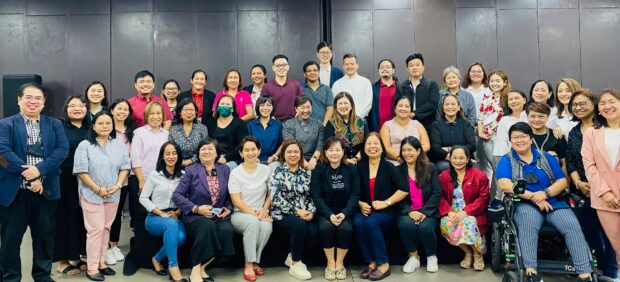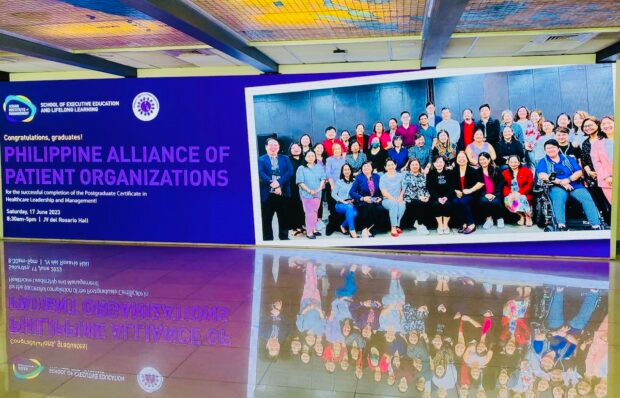The right to health for all people means that everyone should have access to the health services they need, when and where they need them, without suffering financial hardship.
Although our nation’s healthcare has a long way to go in terms of improvement, healthcare professionals across the country have been hard at work on how our nation’s Universal Health Care can progress. This time, it is not solely healthcare professionals who are working to change the healthcare landscape. Now, we have patient leaders to push dialogues and create opportunities for patient voices to be heard.
Recently, the Philippine Alliance of Patient Organizations (PAPO) in partnership with the Asian Institute of Management (AIM) in Makati held the graduation ceremony for their rigorous Post-Graduate Certificate Course on Healthcare Leadership and Management. This is part of PAPO’s vision to be the unifying voice of Filipino patients, where patient leaders across the nation have the unique opportunity to hone their knowledge and skills to drive positive change within the healthcare sector.
During the ceremony, five groups presented their Action Learning Projects (ALP) – which are real-life, results-oriented projects designed to provide participants with more meaningful learning and help ensure the learning in the classroom is translated to the workplace. PAPO looked at innovative ways to improve the Philippines’ current healthcare landscape. In these presentations, the patient leaders discussed the following topics: 1) Project Padayon, a toolkit guide for local health officers in organizing and partnering with patient groups; 2) Developing a strategic partnership for people-centered healthcare; 3) automation of Filipino medical records through mobile application development, 4) Increasing access to financing for rare disease patients; and 5) enhancing the patient experience in accessing financial assistance through the Malasakit Center.
“Mas lumakas ang confidence naming mga PAPO leaders through the program after knowing now how to frame problems and propose solutions in a better way,” says PAPO trustee Mel Lamsin. “Our ALP is all about helping indigent patients regarding financial assistance. We saw the pain points of patients and what the government should tackle and the solutions that patients can offer. That is why patient leaders are important, so we can serve as the patient’s voice in important matters and co-create solutions.”

A Pioneer in Healthcare Leadership Education
AIM and PAPO co-developed the customized, first-of-its-kind program under the School of Executive Education and Lifelong Learning. Patient leaders had the opportunity to hone their leadership skills toward creating a people-centered approach to health care.
“Each of the patient leaders is a volunteer, and they don’t have any compensation, but because of their personal experience, either as a patient or a carer of someone with the disease, this motivated them to start their patient advocacy,” says PAPO president Karen Alparce-Villanueva.
The primary objective of the program is to enhance the capabilities of patient leaders, empowering them to effectively lead and transform their organizations. By equipping them with the necessary skills and knowledge, these individuals can play pivotal roles as members of the local health boards. The program aims to foster their active participation in decision-making processes, enabling them to contribute meaningfully to the improvement of healthcare systems at the grassroots level.
“Under the Universal Health Care law, there’s going to be a functioning local health board, and we want the patient’s voice to be represented and reflected in these local health boards. But we realize we cannot come there unprepared,” says Alparce-Villanueva. “That’s the reason why we have the courses to prepare ourselves mentally, physically, emotionally, and then have the confidence because we will be sitting with other stakeholders. This course will further enhance our leadership, strategic thinking, and our empathy through design thinking, which is the major framework that we learned from this program.”

Patient voice matters
In recent years, there has been a general trend toward transforming the healthcare system from something that happens to patients, into something that happens with them. Listening to patients and their families, and involving them in the development of diagnosis, treatment, and after-care services will improve patient care and experience. This is why a strong patient voice matters.
“We hope to develop leaders that will be inspired to do good things that will be beneficial to society and in its transformation,” says Albert Mateo, Head of the School of Executive Education and Lifelong Learning at AIM. “Today, I think we have achieved that by allowing these patient leaders to be empowered, see their passion and the burning desire how to contribute moving forward. “I’m looking forward to seeing that the action learning project that the patient leaders have just presented is only the first of the many, many projects they will do eventually.”

A community of champions to empower Filipino patients
This strategic collaboration between PAPO and AIM was also supported by key players in the pharmaceutical industry, represented by the Pharmaceutical and Healthcare Association of the Philippines (PHAP) and sponsors, including MSD, Roche, and Boehringer Ingelheim.
“As a member of PHAP, we at MSD stand with PAPO, AIM, and the broader community in championing patient-centered health care for Filipino patients. We laud PAPO for bringing this vision closer to reality by equipping patient leaders through this postgraduate course, and feel honored to be among the sponsors,” said Andreas Riedel, President and Managing Director, MSD Philippines.
The journey towards a better future for healthcare in the Philippines relies on the active involvement and empowerment of dedicated leaders. By investing in the education and capacity-building of patient advocates and group leaders, PAPO is nurturing a generation of change-makers who possess the knowledge and skills to transform their organizations and contribute to local health boards. As these individuals disseminate their learnings and add value within their communities, a ripple effect occurs, ultimately leading to an enhanced healthcare system.

